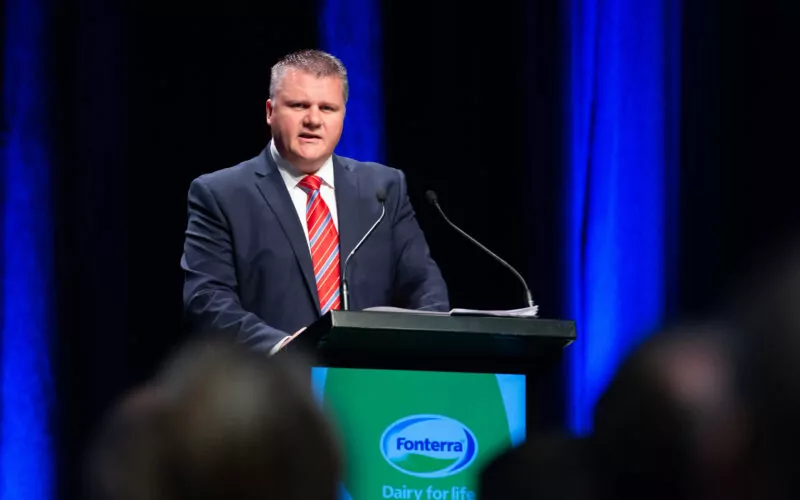Escaped youth tracked by Eagle helicopter, found hiding in New Brighton
The young person who escaped from a youth justice facility in Rolleston has been located...

Fonterra Chief Executive Miles Hurrell has defended the high cost of dairy products in New Zealand, saying international demand and global pricing structures are driving domestic prices.
The price of butter has increased by more than 60% in the last year.
Hurrell, who earns just under $6 million a year, said the dairy giant would generate approximately $25 billion in revenue for the New Zealand economy this year, with 95 percent of Fonterra’s products exported overseas.
“This is a good news story for New Zealand,” he said, referring to a significant rise in international butter prices, which have increased by around 60 percent over the past two years.
Hurrell made the comments in a media stand-up following a meeting with Finance Minister Nicola Willis in Wellington. He said the meeting was pre-arranged and included discussions with more than a dozen ministers and MPs.
He acknowledged the cost of living pressures facing New Zealanders and said the retail price of butter was largely out of Fonterra’s hands, with about 80 percent of the price determined by international markets. The remaining margin of five to 10 percent, he said, covers costs across the supply chain, including retail, processing, logistics, and distribution.
“There’s no hidden cost in that,” he said. “Margins are not profit.”
Asked whether he felt any social responsibility to ease prices for New Zealanders, Hurrell acknowledged the current environment was difficult. He said he understood the financial strain consumers were under but reiterated Fonterra’s focus was on earning export dollars to support the national economy.
He said Fonterra had a role to play in upholding its social licence and pointed to the cooperative’s 8,500 farmer families who contribute to their communities. He also mentioned initiatives such as the KickStart Breakfast programme, which supports schools across the country.
When pressed further on whether Fonterra had an ethical or social obligation to deliver more affordable products domestically, Hurrell said the company was already doing so and added that Fonterra was not the only player in the sector.
“There are 13 dairy companies in New Zealand,” he said. “That’s often forgotten. We’re the biggest, but we’re not the only one. We do acknowledge our responsibility to keep New Zealanders informed about what’s happening in the market.”
He rejected the idea that Fonterra operated as a monopoly and said the company’s size enabled it to maintain strong international relationships, which in turn helped generate returns for the national economy.
Hurrell also dismissed the idea of introducing a two-tier pricing system to make domestic dairy more affordable, saying such a move would undermine Fonterra’s ability to compete globally.
He confirmed that Fonterra’s operating costs had remained steady year-on-year, despite inflationary pressures, and said the cooperative was becoming more efficient.
When asked directly about affordability and whether he understood what everyday consumers were facing, Hurrell said he had visited a supermarket the night before and was aware of the challenges. He declined to discuss his salary in detail, saying it would be published in the company’s annual report in a few months.
Hurrell said there had been no discussion with the Finance Minister about specific measures Fonterra could take to reduce prices, but the company had been transparent about global conditions and ongoing strong demand for New Zealand dairy products.
Butter prices, he said, were currently at their highest level in recent memory, and while Fonterra is a cyclical business, he did not expect prices to ease in the short term.


